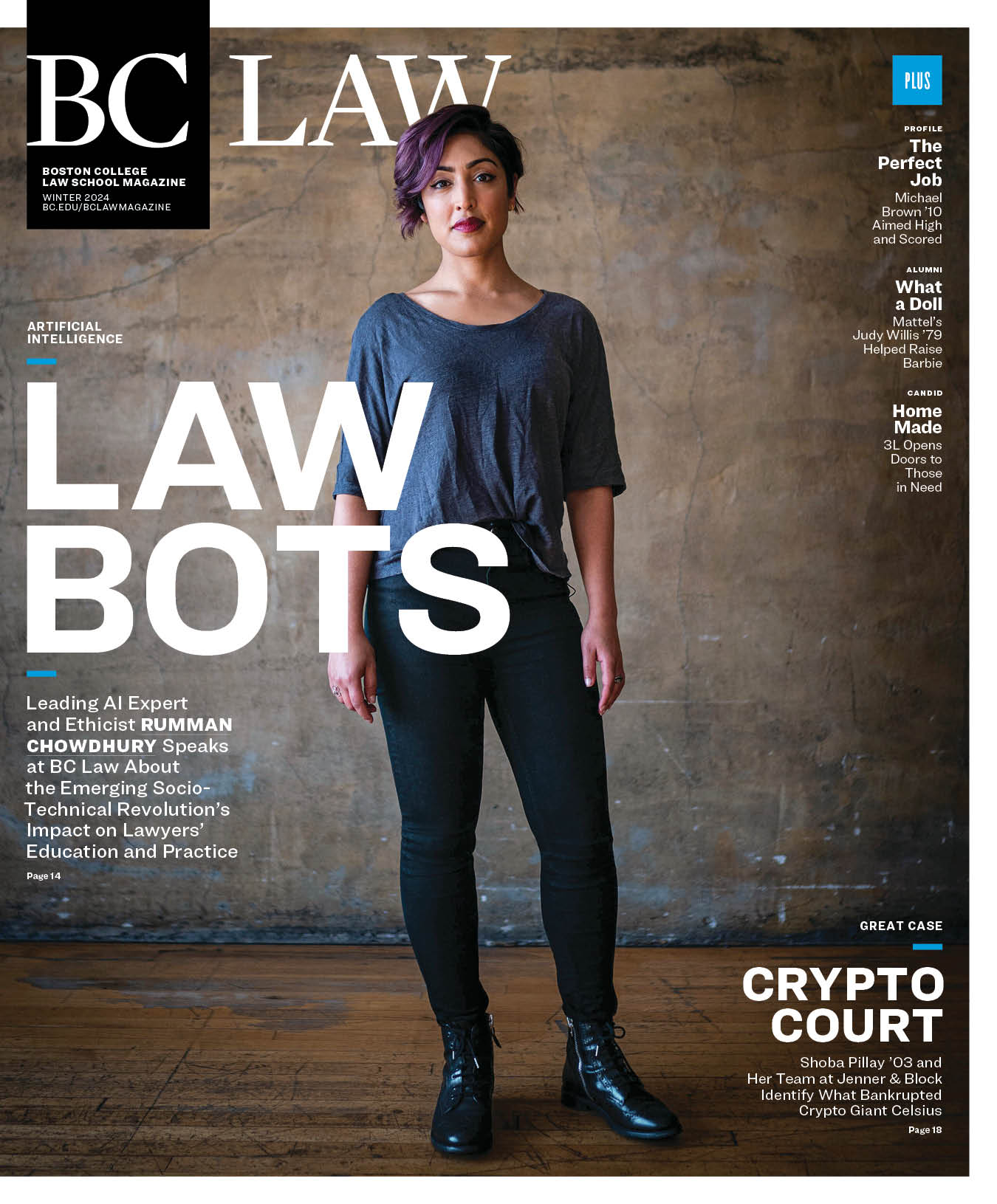Shoba Pillay ’03 is a truth-teller for justice. A partner with the Chicago firm Jenner & Block and a former federal prosecutor with deep experience investigating cybercrime and complex fraud, Pillay was appointed in September 2022 to the prestigious position of bankruptcy court examiner in the devastating crash of the cryptocurrency lending platform known as Celsius Network, LLC.
It had become publicly clear that Celsius was in trouble in June of that year, when the company suddenly froze its customers out of $4.7 billion worth of deposits and sent market-wide crypto prices plummeting in an already depressed market. By the time Celsius filed for bankruptcy in July, its assets had evaporated by $17.8 billion in less than four months. Celsius founder and former CEO Alex Mashinsky and other top executives have been sued by federal regulators and arrested on federal fraud charges.
Most troubling to Pillay is that thousands of individuals and families who had entrusted Celsius with their life savings lost everything. They may never be made whole. But they did get one form of justice: a full public accounting of exactly what happened. Pillay made sure of it.
“People lost their life savings. People were suicidal. It was a tragic impact on real people around the world,” Pillay says. “That’s what really motivated me: being able to find the facts to help people understand what happened to the extent that helped them articulate good arguments in furtherance of their claims in bankruptcy.”

Cryptocurrency, also called crypto or crypto assets, is virtual currency. Bitcoin is perhaps the best known example. Unlike the US dollar, cryptocurrency is not backed by the government, and crypto transactions are recorded and verified using blockchain technology, outside of the regime of traditional banking. Blockchains are public ledgers of cryptocurrency transactions. They are safeguarded by cryptography.
Established in 2018, Celsius marketed itself as a safe place to deposit cryptocurrency in exchange for annual interest rates as high as 18 percent. Pillay found otherwise. Her examiner’s report concluded: “The business model Celsius advertised to its customers was not the business model that Celsius actually operated.”
Celsius, she found, promised customers that investment loans on their deposits would be secured by “over 100 percent collateral.” They were not. Celsius promised to insure its depositors’ cryptocurrency against losses. It did not. Celsius promised full transparency, but failed to disclose that the initial coin offering of its own cryptocurrency, the CEL, fell $18 million short of expectations. Celsius told customers it would purchase CEL to pay them interest, but was instead buying CEL to artificially prop up its price; between March 2020 and June 2021, Pillay found, the price of CEL rose by 14,751 percent. But there was no market for CEL outside of Celsius, and the outcome was disastrous. “In 2022,” Pillay revealed in her report, “Celsius employees routinely discussed that CEL was ‘worthless,’ stating that its price ‘should be 0,’ and that Celsius should ‘assume CEL is $0 since we cannot liquidate our current CEL position.’” Meanwhile, Mashinsky made at least $68.7 million on the sales of his CEL tokens.
Bankruptcy courts seldom appoint examiners, who conduct neutral, independent investigations into issues defined by the court. When courts do so, “it’s usually in important cases to the economy or to the development of how things are going to be dealt with in a particular industry,” says Catherine Steege, a bankruptcy lawyer and partner at Jenner & Block, whom Pillay counts as a mentor. Before Celsius, few cryptocurrency companies had filed for bankruptcy in the US, but cases were beginning to pile up: In 2022, along with Celsius, crypto bankruptcies exceeding $1 billion were filed by Voyager Digital, Core Scientific, BlockFi, Three Arrows Capital, and, notoriously, Sam Bankman-Fried’s FTX. Pillay’s work, Steege says, “will be helpful to cleaning up the industry.”
Among the reasons that bankruptcy examiners are rarely appointed is that their services cost money, potentially leaving less money available to pay the bankrupt company’s creditors. The representatives of the 600,000 unsecured creditors in the Celsius case initially opposed Pillay’s appointment, but her work likely saved them money in the end.
Shoba Pillay’s task amounted to getting enough discovery out of unwilling Celsius employees to untangle, account for, and describe in detail the intricacies of a multi-billion-dollar company that had neglected to keep the most basic of financial records, and whose CEO, Mashinsky, had no experience in finance or crypto.
According to Chief United States Bankruptcy Judge Martin Glenn, who presided over the Celsius case, there was so much distrust among the parties that an independent examiner was needed. In addition, Celsius was under investigation by numerous state and federal regulators. “Shoba had very good communications with each of them,” Glenn says. Because they had more confidence in her and her independence, they were willing to rely on her investigation rather having to duplicate all of the work themselves, making it less costly for the regulators and for Celsius. In other words, because Pillay had the respect and trust of the parties and the regulators, her work helped to preserve more of the bankruptcy estate from which the creditors would be paid. (Celsius was ultimately reorganized rather than liquidated, and its creditors will get between 67 percent and 85 percent of what they’re owed.)
Though Pillay’s reports were hearsay and thus inadmissible as evidence, the insights they provided were invaluable. “Shoba’s reports had the broader view of what happened, what the consequences of that were, and it set the table for how the other professionals go ahead and try to come up with a plan to go forward from there,” Glenn says. “I’ve been told that copies have been given to various congressional investigators and committees that are looking into crypto.”
It was Pillay’s colleague Steege who encouraged her to apply for the examiner’s position. As a federal prosecutor, Pillay had investigated crimes involving cryptocurrencies on the Dark Web. Steege became aware of Pillay’s expertise when, in response to a question at an event for the firm’s women lawyers, Pillay effortlessly expounded on the subject of blockchains. Days later, Steege learned that the bankruptcy trustee had moved for the appointment of an examiner in the Celsius case. Pillay was ultimately chosen from among forty applicants, not only because of her credentials, Steege believes, but because it was clear that she cared about the mom-and-pop customers who had lost so much in this case.
Pillay had just four months to conduct her investigation and write up her findings and conclusions. She submitted two reports that together were some 1,000 pages long. “It was probably the fastest and hardest investigation I’ve really ever done despite having done hundreds of investigations as a prosecutor,” she says.
Her task amounted to getting enough discovery out of unwilling Celsius employees to untangle, account for, and describe in detail the intricacies of a multi-billion-dollar company that had neglected to keep the most basic of financial records, and whose CEO, Mashinsky, had no experience in finance or crypto and who told her during a seven-hour interview that his “unique skill” was his ability to “project into the future and imagine what the world is going to be like.” (Among the jaw-dropping revelations in her report is a statement Mashinsky made at a 2021 company meeting: “We are three years old and we still don’t have any way to reconcile what we owe our customers vs. what our borrowers owe us.”)
“In the most contentious or complicated factual scenarios or complicated team dynamics, Shoba could navigate anything and get us moving forward.”
Sarah Weiss, a Jenner & Block partner and Pillay’s chief of staff, said of the nearly seventy-member team Shoba led.
To get the job done, Pillay needed staff. She hired her law firm to represent her in her capacity as a court-appointed examiner. Jenner & Block had experience with this sort of appointment: Its former chairman had served as the court-appointed examiner in the massive Lehman Brothers bankruptcy case in 2009. Dozens of Jenner & Block’s partners, associates, and paralegals joined Pillay’s effort. She also hired a financial consultant to help analyze the financial and crypto issues. “In total, we had approximately sixty-five or seventy individuals on the team,” she says.
As the investigation proceeded, Celsius dragged its feet. “The debtors were not particularly cooperative and we struggled getting documents in a timely fashion,” Pillay says. Yet, even though she had subpoena power, she never had to use it. Instead, she told Celsius’s lead counsel that she was going to include in her reports all the instances that Celsius tried to hinder her investigation. “Ultimately, that argument was successful,” she observes.
Sarah Weiss, a Jenner & Block partner, was Pillay’s chief of staff. “In the most contentious or complicated factual scenarios or complicated team dynamics, Shoba could navigate anything and get us moving forward,” Weiss says. Weiss recalls a marathon Zoom session with ten partners going line-by-line through hundreds of pages of a draft, just days before the final report was due. It was one in the morning, and Pillay needed to take her dog Panda for a walk. “So, she left and it was snowing outside, and I didn’t know this at the time, but her dog was super-excited about the snow,” Weiss says. “Panda was just loving the snow and Shoba was loving the dog loving the snow. And so, we didn’t have her for, I don’t know, fifteen minutes… and we progressed two sentences while she was gone,” Weiss laughs. It was a great team, and when Pillay returned, they got the rest of the job done.
Melissa Root, Jenner & Block’s Chicago office managing partner, describes Pillay as leading the effort efficiently and methodically, with grace and thoughtfulness, always composed and appreciative of everyone’s work. The judge, Root says, “was particularly effusive in his praise.”
“There was so much distrust and concern that there would not be transparency in this case by the customers and the folks that were most affected by Celsius’s demise,” Root says. That Pillay and her team, as neutral investigators, prepared a report that told the story in a clear, comprehensible way: “That is a real value to that particular community,” Root says.
With all the bankruptcies and investigations and prosecutions, it’s easy to wonder: Is cryptocurrency inherently bad, or is something else going on? Mari Tomunen, an adjunct professor who teaches blockchain law at BC Law and has represented crypto firms, believes that the high-profile alleged wrongdoing of actors like Mashinsky and Bankman-Fried is harming the reputation of the crypto industry. “It will take a few years for the actual legitimate long-term business models to adopt this new technology,” Tomunen says. “I think we are still in the early phases and this wave of criminal activity has slowed down the adoption of cryptocurrencies for sure.”
BC Law Professor Renee Jones notes that crypto investment firms like Celsius are prone to the kinds of problems that often afflict Unicorns, which are privately held start-ups valued at $1 billion or more. Jones says that venture capitalists often invest in Unicorns without providing effective mechanisms for accountability. “Venture capitalists aren’t providing the oversight they once did,” Jones says. “Another thing,” she says, “is that many start-ups are engaging in legally questionable conduct and hoping to get big enough so they gain the power to change the law,” a strategy that some call “regulatory entrepreneurship.”
SEC Chair Gary Gensler has stated publicly: “I have one goal with regard to the crypto markets: to ensure that investors and the markets receive all the protections that they would in any other securities market.” Gensler says that crypto companies should be registering with the SEC and complying with all securities laws—something they have been resisting, even in the face of robust SEC enforcement.
The industry wants cryptocurrencies to be classified not as securities, but as commodities, regulated not by the SEC but by the Commodity Futures Trading Commission (CFTC). The nonprofit watchdog Better Markets is critical of the idea of CFTC oversight of crypto. “The CFTC is a very small agency that has been chronically underfunded and understaffed for years, bringing a total of just eighty-two enforcement actions in 2021 compared to the SEC’s 760 cases,” Better Markets has reported. “It does not have a robust investor protection mandate, history, or culture, and its markets are almost exclusively large institutional traders, not retail investors. It is also viewed as decidedly crypto-friendly, raising questions about the sustainability of its already minimal enforcement program.”
Pillay’s detailed, meticulously documented examiner reports are unignorable contributions to the policy conversations around crypto companies. “I like to think that our public report not only provided information to all the parties in the bankruptcy matter, but it also—and we’ve been given this feedback—really helped the marketplace better understand what happened, not only in this matter, but in some of the other similarly situated bankruptcies,” she says.
Pillay has done her job and told the truth. Whether the industry will be tamed enough—and soon—so that people’s investments are protected remains to be seen.



